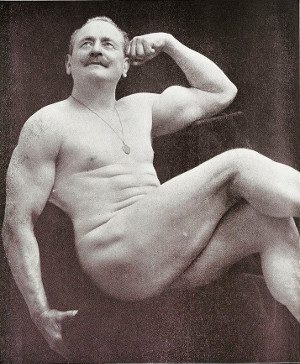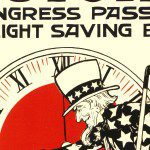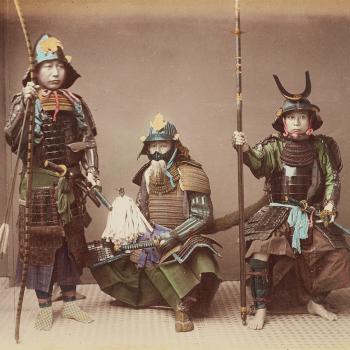A few weeks ago my learned colleague John Beckett wrote about his thoughts on “Men’s Mysteries”. I was stumped when he said “I’ve never really thought of myself as a man…. I’m a person, I’m a human, I’m me.”
Now Randall Munroe, author of the web comic xkcd, once quipped: “The role of gender in society is the most complicated thing I’ve ever spent a lot of time learning about, and I’ve spent a lot of time learning about quantum mechanics.” This is a minefield of complexities, so before I go dancing through it let me try to state a few points plainly, lay down a few boundary markers:
1) No person should be discouraged from pursuing any career, hobby, or interest, or be denied legal or social equality, on the basis of gender. Nothing I ever write about gender is intended to say “you can’t do that, that’s only for men/women to do”; it’s meant in the context of “here are some ideas about manhood I’ve found useful in my own self-exploration.”
2) To the extent that there may be differences between genders (see point 3), they are a matter of statistical averages and ranges which usually overlap, not absolute partitioning. To take a (hopefully non-controversial) example, men are on average taller than women, there is a demonstrable statistical correlation between gender and height. Yet I’ve dated women taller than I am. (I’m 5’7″ with my shoes on.)
Anyone who thinks that my height makes me less of a man, or my taller paramours any less women, is — to use an idiom redolent of old-fashioned masculine violence — cruising for a bruising. And if you want someone to help you get something off the top shelf, you need to judge applicants for the position by height, not gender.
3) Because gender roles have been heavily socialized for all of human history (and probably well back into prehistory), it’s very difficult to say whether any observed statistical differences between genders are due to socialization or due to innate differences. (We might even question whether the height difference mentioned in point 2 above was due to environmental differences, boys being better fed than girls or something, though my money would be against that.) However, see point 4.
4) If gender were entirely a matter of socialization, it would be difficult to account for how people socialized as one gender can find that they identify as another; that their lives are improved when they internally and externally adopt a gender identity other than the one society has told them they are since birth. The experience of transgender people, the struggle they engage in to be true to their own deepest self, merits respect.
It’s not my place to speak for transgender folks but I find it hard to resolve what I have read and heard from them with the idea that gender identity is shaped entirely by socialization. (However, given point 3 I can advance that statement only tentatively.)
And when I speak of male or female, I mean to include any person who honestly claims that identity, without regard to features of gross anatomy. The physiological correlates of gender we’re interested in are in the brain, not the genitals.
I also want to acknowledge non-binary, agender, or other identifications, even though I won’t be discussing them here. As Munroe said, it’s complicated! And if I don’t cover all possible cases in that complexity it’s not meant as a denial that they exist.
So, with those disclaimers in place, let’s look at what John writes:
I’ve never really thought of myself as a man – that’s probably got something to do with my lack of interest in men’s mysteries. I’m a person, I’m a human, I’m me.
It’s curious to me that there seem to be some adult males who seem reluctant to identify as men. I’m not referring to those who have some biologically male characteristics but claim a non-masculine gender identity; I mean people who present as male, who live as men to all observations, who check that “M” box on the paperwork without a second thought, but who seem to find being a man somehow declasse.

Perhaps that’s a result of John being brought up in a narrow and strict gender model:
Now, I was forced to think of myself as a boy. When and where I grew up, gender was strictly defined and absolutely binary….If I wanted to cook, do embroidery, and wear pink, why was that a problem? I have to give my Southern, conservative, Baptist parents credit – at home, it mostly wasn’t. But nobody had to tell me there were things I shouldn’t talk about at school – I knew the reaction wouldn’t be nice.
If being a boy or a girl or a man or woman is a matter of fitting into a rigid box, and one doesn’t fit within that box, then I suppose it makes sense that one wouldn’t think of oneself that way.
On the other hand, if one was brought up among people expressing their male gender identity in a variety of ways, one might come to see gender as a matter of partly-overlapping clusters of traits.
As a kid I saw some diversity in manliness: from my stern, WWII Navy veteran, crew-cut maternal grandfather to my long-haired guitar-playing hippie-type uncle (who obviously had no influence on me at all); from my professorial and dapper elementary school principal, to the mix of blue and barely-white collar fathers of the neighborhood, to the parish priests.
Yes, I probably would have gotten some trouble about wearing pink (despite the fact that not that long ago pink was considered a masculine color[Broadway] — an excellent example of the social construction of gender). But a boy learning the basics of cooking and sewing wasn’t frowned on. Indeed it was mandatory middle school home economics for all kids.
The East Baltimore suburbs in the 1970s and 80s were no utopia of gender liberation, but growing up there was enough to teach me that the territory of manhood has some width to it.
With that in mind, what do we mean by “men’s mysteries?”
The root of “mystery” is the Greek mústēs, “initiated one”. And while the mythopoetic men’s movement a la Robert Bly has a fair amount of folly in it, it did get one thing very right: our lack of initiation for young men is a problem.
There are two senses in which we can speak of initiation. There is the experiential sort of initiation, where one has an experience for the first time. This is the sort of initiation we might find in the ways John speaks of women’s mysteries:
Menstruation, pregnancy, childbirth, lactation – those are more than biological functions. There’s something mysterious about them, in the sense that you have to experience them to understand them (which is one of the reasons I can’t).
But initiation can also be a social phenomenon, in which the initiate is welcomed and recognized as a member of a group or class of people by the members of that group. In this respect, only men can initiate a man. And through that initiation a boy can be allowed and encouraged to adopt behaviors and attitudes of the mature masculine.
I have been fortunate in my life to have women teachers who initiated me into some of my roles. There’s my karate sensei who initiated me as a black belt and a teacher of the martial arts, and my shiatsu teacher who initiated me as a healing arts practitioner. (I almost fell down when she, a nationally known expert in Asian Bodywork Therapy, referred to me as a “colleague.” Squee!) Those are important and valuable things that are independent of gender.
But neither of these deeply respected teachers could welcome me as a fellow man. None could say as a man, “we accept you, one of us.”
That initiation may not need to be an involved thing or a formal ritual. I sometimes think of a simple hand on my shoulder by a man I much admired as being equally powerful as any ritual. It was a simple “hey, here we are together, equally two men before the world.” It only took a second, but more than twenty-five years later it still does my heart good to think about it.
Indeed when I think of my most intimate moments with other men they are more about actions than words, like a friend making me a meal when my heart was shattered. I think Robert Hayden’s poem “Those Winter Sundays” and its image of love expressed wordlessly captures something important about masculinity:
Sundays too my father got up early
and put his clothes on in the blueblack cold,
then with cracked hands that ached
from labor in the weekday weather made
banked fires blaze. No one ever thanked him.[Hayden]
But I don’t want to get too much into the nature of masculinity, or the question of how much formal ritual is necessary for initiation, here. Let’s stick to the case that masculinity exists, and that it’s important that boys are initiated into a healthy version of it..
It is, on a statistical and average and typical level, different to be a man in this world than to be a woman. Perhaps in some hypothetical utopian society where all genders had full legal and social equality this would not be the case; or perhaps there are genuine biological differences between the sexes that will always be reflected statistically in gender. (See points 3 and 4 above.) But we must do our work in the culture in which we find ourselves, not in a hypothetical future utopia.
As men in this culture, we have a different relationship with violence. To take the clearest and most dramatic example, we men are almost four times more likely to be a murder victim and about seven times more likely to be a murderer compared with women. And the circumstances that lead to us being killed are different; female victims are more likely than male victims to be killed by an intimate partner or family member, while men are more likely to be killed by friends, acquaintances, or strangers.[Cooper, 9-10]
(I say “clearest example” because the reporting rate for homicide is high — dead bodies are usually reported to the police. There are gender differences in victimization and perpetration in other crimes too, most obviously sexual assault, but the data is less clear due to reporting issues and varying legal definitions — and the omission of large numbers of assaults and rapes occurring in prison.[Glazek])
Those are the statistical facts, though how much of them being the result of nature vs nurture is debatable. (See point 3.) The power structure has an interest in keeping a certain reserve of violent behavior around, to direct in war. When we American males turn 18 we’re legally required to register with “Selective Service” so that the state can, if it chooses, use our bodies as tools to carry out some violent policy. (I like to think I would have have the courage to tell them where to stick that plan, but fortunately it never came up.) So maybe this violence to some extend encouraged by the state. Maybe not, maybe it’s just exploited by it. But either way, it exists.
Early childhood educator Erika Christakis put it well when after the Aurora, Colorado movie theater shooting she wrote:
For millennia, human society has struggled with what to do with young men’s violent tendencies. Many cultures stage elaborate initiation ceremonies, presided over by older men, which help channel youthful aggression into productive social roles. But in contemporary society, we have trouble talking about the obvious: the transition from boy to man is a risky endeavor, and there can be a lot of collateral damage.[Christakis]
It’s our job as men, as adult males who have been through that transition ourselves, to help other males make it through.
Men also typically have a different experience of emotion than women do. This is not just a matter of observational bias, it can be seen in functional MRI scans[Canli]. And research also shows that men and women communicate emotion differently through touch,[Hertenstein, 70] suggesting that we experience it in our bodies differently.
Again I emphasize that this difference is at least partly, and possibly entirely, due to socialization — brain structure and function is shaped partly by environment. But it is the fact on the ground that we must deal with. And again this is a matter of averages and typical experiences. Your manly mileage may vary.
But most importantly, we will be seen by boys as role models in ways that women will not be. I do not say that this should be the case or that it should not be. I am acknowledging the fact that it is so. The boys to whom I teach karate look at me differently than the girls I teach do; and when I introduce these young students to my own sensei, it’s the other way around.
Whether we take a role in a formal mystery rite of initiation, or whether we someday look at a young male person and see in him a man and let him know this, we are the holders of men’s mysteries. Only we can welcome a boy into the company of men.
And to duck that responsibility seems to me unmanly. Not in the sense of being thereby feminine, for our sisters have their own responsibility along these lines, but in the sense of being less than fully mature. I’m sure that John Beckett doesn’t shirk that duty, and I’d suggest that he might “get” men’s mysteries more if he thinks about the topic in terms of how he helps boys over that transition.
References
Broadway, Anna. “Pink Wasn’t Always Girly” . The Atlantic. 12 Aug 2013, http://www.theatlantic.com/sexes/archive/2013/08/pink-wasnt-always-girly/278535/
Canli, Turhan, John E. Desmond, Zuo Zhao, and John D. E. Gabrieli. “Sex differences in the neural basis of emotional memories”. PNAS 99.16 (2002): 10789-10794. 26 Jul 2002, DOI:10.1073/pnas.162356599 http://www.pnas.org/content/99/16/10789.full
Christakis, Erika. “The Overwhelming Maleness of Mass Homicide.” Time.com, 24 Jul 2012. http://ideas.time.com/2012/07/24/the-overwhelming-maleness-of-mass-homicide/
Cooper, Alexia and Erica Smith. “Homicide Trends in the United States, 1980-2008.” Washington D.C: U.S. Department of Justice, Bureau of Justice Statistics, 16 Nov, 2011. NCJ 236018. http://www.bjs.gov/index.cfm?ty=pbdetail&iid=2221
Glazek, Christopher. “Raise the Crime Rate.” n+1 Issue 13: Machine Politics, Winter 2012. https://nplusonemag.com/issue-13/politics/raise-the-crime-rate/
Hayden, Robert. “Those Winter Sundays”. Poetry Foundation http://www.poetryfoundation.org/learning/guide/177415#poem
Hertenstein, Matthew J. and Dacher Keltner. “Gender and the Communication of Emotion Via Touch.” Sex Roles 64 (2011): 70-80. 9 Oct 2010. DOI 10.1007/s11199-010-9842-y http://citeseerx.ist.psu.edu/viewdoc/summary?doi=10.1.1.292.9341
You can keep up with “The Zen Pagan” by subscribing via RSS or e-mail.
If you do Facebook, you might choose to join a group on “Zen Paganism” I’ve set up there. And don’t forget to “like” Patheos Pagan and/or The Zen Pagan over there, too.

















